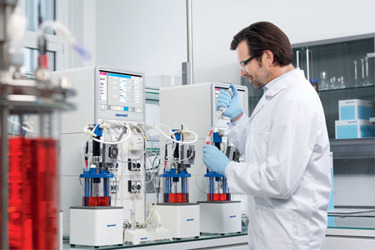Adeno-Associated Virus Production In Suspension Cell Culture Using The SciVario® Twin Bioprocess Controller

Vaccines are essential tools for resisting pathogens and controlling global pandemics. Various types of virus vaccines, such as live attenuated, inactivated pathogen and subunit vaccines have been widely produced using mammalian cell culture. However, they often rely on attachment cell culture. For higher production capacity, increased yield, and most importantly, ease of production scale-up, it is more desirable to produce vaccines in suspension cell culture platforms. The widely available suspension bioreactors used in antibody production will allow a faster development process of versatile vaccine platforms. Novel technologies such as mRNA vaccines, Adeno virus vector and Adeno-associated virus (AAV) vector-based vaccines have all played a key role in controlling the recent COVID-19 pandemic.
Cell culture produced AAV vectors have gained momentum as one of the most effective gene & protein delivery tools in vaccine production as well as gene therapy. The higher safety rating due to the fact that wild-type AAV is not currently known to cause disease in vivo, low immunogenicity and a wide range of infectivity are the most important advantages of AAV vectors making them a leading platform for gene delivery. Highlighted here is an example of scalable AAV production on a suspension cell culture platform through the AAV-2 capsid production process in a controlled environment using a bioreactor control system and Expi293F cells.
Get unlimited access to:
Enter your credentials below to log in. Not yet a member of Bioprocess Online? Subscribe today.
